High peaks and wildlife put Tanzania on the tourist map
October 30, 2012 -- Updated 1630 GMT (0030
HKT)
STORY HIGHLIGHTS
- Tanzania has Africa's highest mountain, 500 miles of coastline and 15 National Parks
- The country was formed by the union of Tanganyia and the islands of Zanzibar
- Serengeti National Park is famous for its annual migration of two million wilderbeest, gazelles, zebras
Each week, Inside
Africa takes its viewers on a journey, exploring the diversity of different
cultures, countries and regions. Follow the team on Twitter
(CNN) -- Home to Africa's highest mountain and one of its
most famous wildlife parks, Serengeti, Tanzania is one of the continent's most
popular tourist destinations.
It was recently listed by the New York Times as its number one place to go in Africa, with
783,000
visitors in 2010, according to a World Bank report published in 2012.
It is the largest country in East
Africa, has abundant wildlife, 500 miles of coastline and 15 National Parks.
The United Republic of Tanzania
was formed in April 1964 by the union of mainland Tanganyika and the Zanzibar
archipelago. The archipelago consists of two large islands -- Zanzibar and Pemba
-- and numerous smaller ones.
Mount Kilimanjaro, the highest
peak in Africa at 5,895m, is one of seven Tanzanian
sites on the UNESCO World Heritage List.
Another is Serengeti National
Park, known for its annual migration of two million wildebeests and hundreds of
thousands of gazelles and zebras - followed by their predators. The migration is
described by UNESCO as "one of the most impressive nature spectacles in the
world."
The spectacular Ngorongoro
Crater, the world's largest caldera, is part of the Ngorongoro Conservation
Area, a UNESCO heritage site listed for its natural and cultural
significance.
 Musical icon still sings in
her 90s
Musical icon still sings in
her 90s  Fishing in Zanzibar's
archipelago
Fishing in Zanzibar's
archipelago
Other UNESCO sites are Selous
Game Reserve, listed for its natural beauty; Kondoa Rock-Art Sites, the Ruins of
Kilwa Kisiwani and Ruins of Songo Mnara and Stone Town of Zanzibar, all listed
for their cultural significance.
The annual migration of two million wildebeests is one of the most
impressive nature spectacles in the world.
UNESCO
UNESCO
Of these, the Ruins of Kilwa
Kisiwani and Ruins of Songo Mnara, the remains of two great ports booming
between the 13th and 16th centuries, located on islands off the coast of
Tanzania, is listed as a site in danger.
Alongside the natural
attractions, Tanzania has a rich culture, both traditional and modern.
Zanzibar International Film Festival, also known as the
Festival of the Dhow Countries, is East Africa's largest arts, design, music and
film festival, with most events in Zanzibar's historic Stone Town.
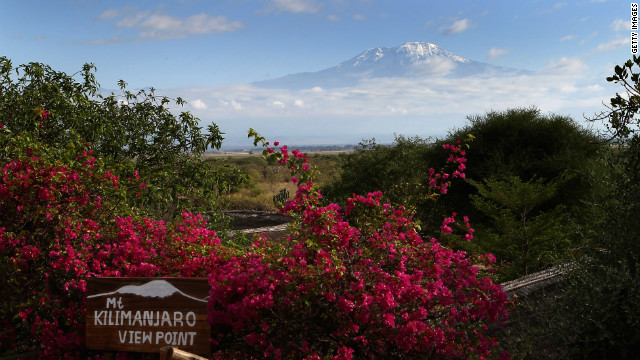 Mount Kilimanjaro, at 5,895m, is the higest mountain in
Africa.
Mount Kilimanjaro, at 5,895m, is the higest mountain in
Africa.
Stone Town in Zanzibar is a UNESCO World Heritage
Site.
A Masai tribesman stands on the slopes leading up to the
Ol Doinyo Lengai volcano in the Ngorongoro Conservation Area, one of seven
UNESCO World Heritage Sites in Tanzania.
Masai men giving a traditional greeting at Majengo Maasai
Boma in Arusha, Tanzania.
Lesser flamingoes at the Lake Natron at the foot of Ol
Doinyo Lengai.
Elephants are among the abundant wildlife in Serengeti
National Park.
Mkomazi National Park, one of 15 National Parks in
Tanzania.
Mount Kilimanjaro
HIDE CAPTION
 Take a walk on the
wild side in Tanzania
Take a walk on the
wild side in Tanzania
Last year the festival attracted
150,000 visitors, including 7,000 from abroad, and included a race of
traditional dhow sailing boats.
For a more traditional cultural
celebration, MaKuYa Festival in the Mtwara region has been held every year since
2008, bringing together hundreds of traditional dancers and cultural events.
One of the country's
longest-running festivals is the Bagamoyo
Festival, held each year since 1982 by TaSUBa, formerly the Bagamoyo College
of Arts. The TaSUBa Theatre, where it is held, is the largest performing arts
venue in East Africa, and attracts musicians performing African music from
reggae to roots to jazz.
An annual charity Goat Race held each
year in Dar Es Salaam is based on a concept from Uganda and has raised more than
500 million Tanzanian shillings ($320,000) for charity over the past 11
years.
Tanganyika and Zanzibar had gained independence from Britain in 1961 and 1963
respectively.
Julius Nyerere, a key figure in
the fight for independence, became the first president of Tanganyika in 1962 and
remained head of Tanzania until 1985.
All of us have come together to say it's high time Zanzibar should be able
once again be able to be in charge of own destiny and plan its own
future.
Ismail Jassu, Zanzibar politician
Ismail Jassu, Zanzibar politician
His successor, Ali Hassan
Mwinyi, started a gradual process of economic liberalization and democratic
reform and in 1992 the constitution was changed to allow for multiparty
competition, according to the British Foreign and Commonwealth Office.
The current president President
Jakaya Mrisho Kikwete has been in power since 2005 and was elected for a second
term in 2010.
Today, although Zanzibar is part
of Tanzania, it has its own parliament and president and a growing movement for
full independence.
Ismail Jussa, a local
politician, said: "Right now there's a grand movement, not just both political
parties of Zanzibar, religious groups, civil society organizations, members of
academia, student organizations, all of us have come together to say it's high
time Zanzibar sovereignty is restored and Zanzibar should be able once again to
be in charge of its own destiny and plan its own future."
The Tanzanian people are split
roughly equally in their beliefs, between 30% Christians, 35% Muslim and 35%
with traditional beliefs, according to the CIA World Factbook. In Zanzibar, the
population is more than 99% Muslim.
Most of the country's population
is Bantu, consisting of more than 120 tribes, including Sukuma, Nyamwezi,
Chagga, Masai, Haya and Gogo.
The commercial center is Dar Es
Salaam, with a population of 3.6 million in 2011, according to the United
Nations Population Division.
The agency said that currently
12 million of Tanzania's 45 million population live in cities, and 33 million in
rural areas.
However, it predicted that both
the rural and urban populations will have grown to 69 million by 2050.
Despite its growing tourist
industry, Tanzania is one of the world's poorest countries, with an
economy that relies heavily on agriculture and employs 80% of the population,
according to the British Foreign and Commonwealth Office.
The average life expectancy is
just over 53 years, with the world's fourth highest death rate from HIV/AIDS,
the CIA World Factbook said.

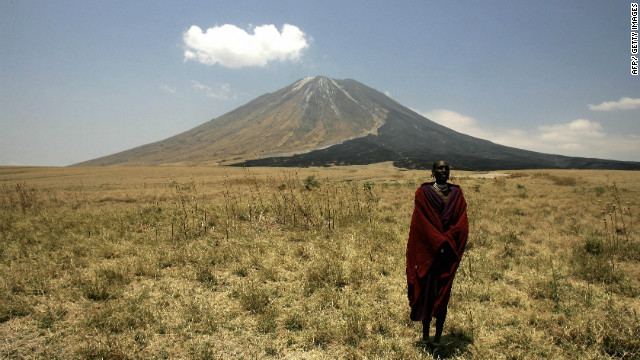
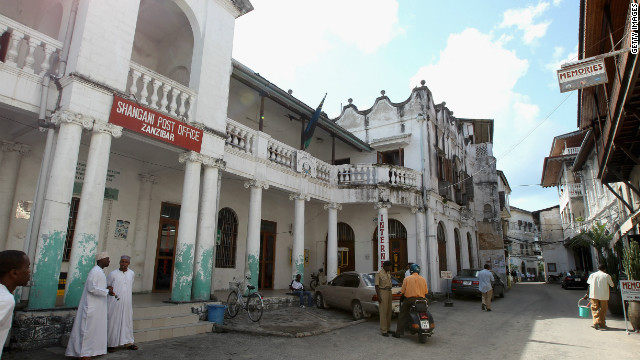 Stone Town in Zanzibar is a UNESCO World Heritage
Site.
Stone Town in Zanzibar is a UNESCO World Heritage
Site.
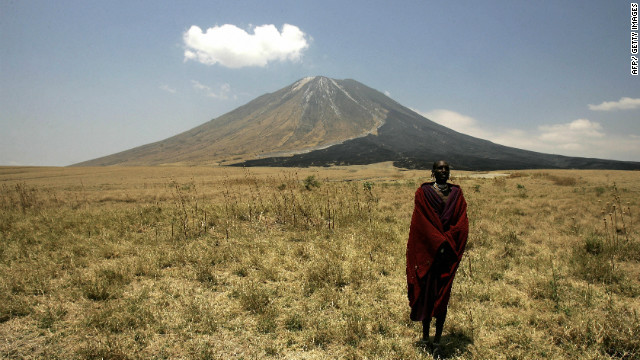 A Masai tribesman stands on the slopes leading up to the
Ol Doinyo Lengai volcano in the Ngorongoro Conservation Area, one of seven
UNESCO World Heritage Sites in Tanzania.
A Masai tribesman stands on the slopes leading up to the
Ol Doinyo Lengai volcano in the Ngorongoro Conservation Area, one of seven
UNESCO World Heritage Sites in Tanzania.
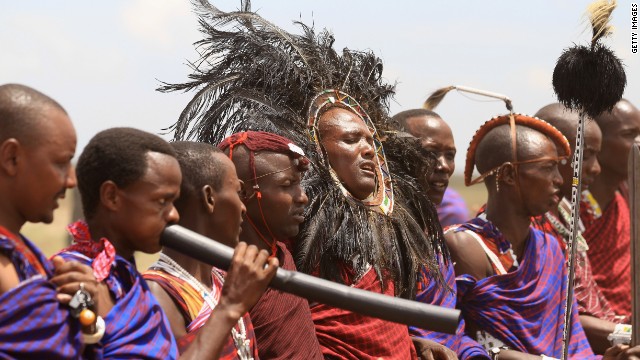 Masai men giving a traditional greeting at Majengo Maasai
Boma in Arusha, Tanzania.
Masai men giving a traditional greeting at Majengo Maasai
Boma in Arusha, Tanzania.
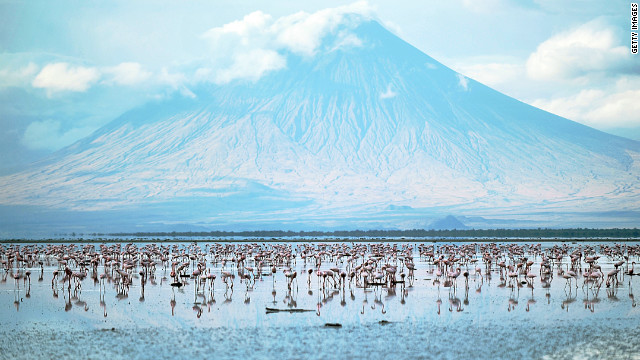 Lesser flamingoes at the Lake Natron at the foot of Ol
Doinyo Lengai.
Lesser flamingoes at the Lake Natron at the foot of Ol
Doinyo Lengai.
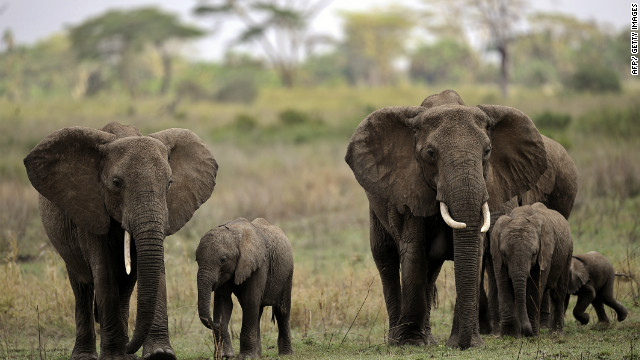 Elephants are among the abundant wildlife in Serengeti
National Park.
Elephants are among the abundant wildlife in Serengeti
National Park.
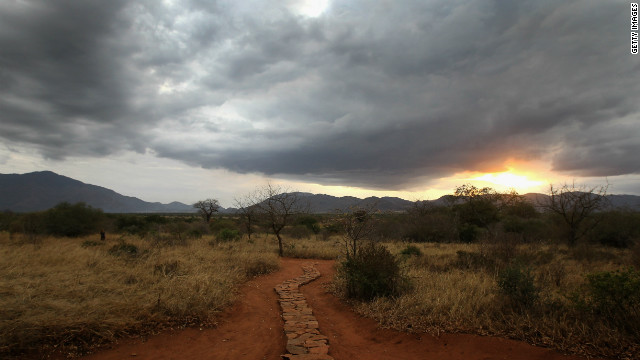 Mkomazi National Park, one of 15 National Parks in
Tanzania.
Mkomazi National Park, one of 15 National Parks in
Tanzania.







ไม่มีความคิดเห็น:
แสดงความคิดเห็น